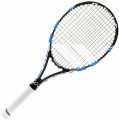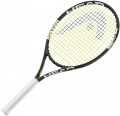Age
The purpose of the racket primarily determines the target category of users for whom this model is designed.
- Adult. Many different racquets fall into this category, created both for
professionals and for people who are taking to the court for the first time. All they have in common is that the size and weight are selected with the expectation that an adult (relatively speaking, from 13 years old) will play the racket, regardless of gender or level of training.
-
Junior. This category includes rackets designed specifically for children under 12 years of age. They are slightly smaller and lighter than racquets for adults, but at the same time, they have a relatively large string surface area, thanks to which the child will miss the ball less, which means he will enjoy the game more. It is not recommended for children to buy adult rackets, as this can lead to excessive stress on still fragile joints.
Racquet length
Length refers to the distance between the top of the head and the bottom of the racquet handle. This indicator for most rackets for adults is in the
range of 68-69 cm. Longer models in fact can provide a stronger hit, especially when serving, but are more difficult to manoeuvre during play. The International Tennis Association does not allow racquets longer than 74 cm to be used in tournaments.
String surface area
There is a simple pattern here: the larger the area of the string surface and the lower the rigidity of the string tension, the higher the impact force and the lower its accuracy. This parameter is directly related to the string formula.
Now on the market there are rackets with the following string surface area:
Midsize (452 – 574 cm²),
Midplus (580 – 677 cm²),
Oversize (710 – 742 cm²).
Balance
By balance, it meant the conditional point of the centre of gravity of the racquet, in other words, the point at which the handle and head of the racquet will have the same weight. Three options are possible: balance in the head, in the handle, or neutral. The number specified in this parameter is the distance from the end of the handle to the balance point. Important clarification: balance is measured without strings!
—
Head. This means that the head of the racquet is slightly heavier than the handle. In fact, this can provide some advantage in hitting and serving.
—
Handle. The balance of such a racquet is in its handle, from which we can conclude that the model is more manoeuvrable and can best perform when playing under the net.
—
Neutral. The balance of this racquet is in the middle, meaning it will not provide any advantage to the player regardless of playing style.
Weight
As the weight of the racquet increases, the impact force increases, but its accuracy decreases. On the contrary, it is easier to swing
with a light rocket, but at the same time, the player needs to make more effort to give the ball the desired speed.

